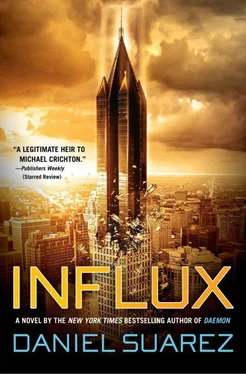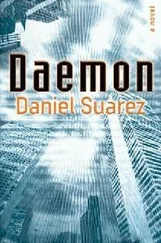But then, as he looked down the length of Washington Boulevard, he saw something distant fly up from the ground—something large, along with pieces of debris. It reminded him of videos he’d seen of tornadoes roaring through trailer parks. Wilkes pulled off his goggles and stared ahead.
And then he saw a UPS delivery truck hurtle into the sky a quarter mile away, tumbling as it went. Following it were what appeared to be trees, light poles, another car. It was as though the ground was peeling up. And now a horrendous thunder came to his ears as if a great machine were being ripped apart. Flocks of nearby pigeons scattered in a panic.
But the armored column roared onward.
And then Wilkes could see the lead tanks falling up into the sky as well, as if they’d driven off a reverse cliff. Red taillights stabbed on the following Strykers as pieces of asphalt, parking meters, manhole covers, trees, grass, sculptures—everything, literally everything—ripped out of the ground and flung itself into the sky. There was the deafening sound of breaking glass as the facade of one of the tall buildings ripped away, but instead of collapsing, it up -lapsed—pouring into the air and shattering into thousands of pieces as people screamed in terror and fled deeper into their apartments.
The Strykers had screeched to a stop now on their eight large rubber tires, but as Wilkes watched, speechless, the tanks were clanging together like great bells and cresting the tops of twenty-story buildings—then falling up, up into the dawn sky, receding, shrinking smaller with every second.
And other vehicles and debris continued to follow them as though on a conveyor belt. The cracking sound of the concrete, as if the bones of a giant were being broken, rippled through Wilkes’s chest. He watched, paralyzed, as a whole section of Washington Boulevard—center meridian, sculptures, asphalt, and Stryker vehicles all—peeled up and came apart as they fell into the sky.
The remaining Strykers tried to turn or back away from the disaster, but the suspension of reality was racing them down the street—and winning. Men were piling out of the gridlocked Strykers now as their rear gates opened. They pulled off their packs and ran screaming away from another building facade ripping upward. Lampposts tore out of the ground; fire hydrants and sidewalks peeled up. Piping and electrical work from the streets dangled upward, their ends swinging as water poured into the heavens as well from a broken main. Soil hurtled upward, splashed through water, and came out mud on the other side.
Soldiers ran past Wilkes now, fear in their faces. He could barely hear them as he watched the sidewalk tearing up a hundred feet away. Soldiers there clawed at bicycle racks, but then the ground beneath it all gave way, the concrete cracked apart, and they spun screaming into the air, their cries receding.
Wilkes’s neck craned up to see a line of debris heading into the heavens. What he knew must be M1 tanks were tiny dots now, crumbs in a vast river.
And then he felt the pull, it started dragging him forward, and he finally came out of his paralysis. Too late.
Almost immediately the feeling of falling tripled, and he grabbed for the light post next to him. The Humvee in the street before him, along with fleeing infantryman, flew upward with the asphalt of the street beneath them, and then the concrete and gravel beneath that, and finally the soil, poured skyward.
As Wilkes held on, he suddenly saw the world differently. It was all clear to him now. What he’d always known as down no longer was down. The city was a great roof over his head.
And as he looked down, he could see that the sky was a yawning chasm beneath his feet. His grip weakened on the lamp pole, and finally it slipped from his fingers as he fell screaming into the vast emptiness below.
• • •
At Site R, Director of National Intelligence Kaye Monahan sat in a mission control center watching live satellite imagery of the operation under way in Detroit. The generals and intelligence directors around her gasped. She herself felt a tingling, almost detached feeling as she saw an entire battalion sucked up and hurled into the heavens, the streets and building fronts along with them.
Now there were fires as what appeared to be a gas main silently exploded.
A hush had gone over the control room.
But then someone said, “Pull them back. For God’s sake, pull back.”
A general next to her said, “Where’s the MK-54?”
“Lost, sir. We have no idea where it is.”
“My God.”
“We just lost a suitcase nuke.”
“Jesus.”
Monahan came out of her stupor and called to an operations officer. “What’s happening?”
The lieutenant colonel examined a radar screen and shook his head. “They appear to be falling up. The leading edge is above a hundred thousand feet already.” He looked up from the screen. “They’re falling off the planet. Apparently the BTC can control gravity.”
The gathered generals and intelligence directors let out a breath and wandered about the control room, trying to process what they were seeing.
A four-star general said, “We have no choice now. We’ll need to tell the president.”
The deputy director of the CIA scowled at him. “The last thing we need is politicians involved in this mess.”
The NSA deputy director nodded. “We can’t tell anyone about the BTC. If people find out how powerless civilian government is, there’ll be a political crisis.”
Monahan looked from one to another. “Then what do we do? We can’t do nothing.”
The deputy director of the CIA grimaced. “Maybe it’s what we should have been doing all along. Just leave them alone. Let things go back to the way they were.”
She looked up at the big satellite screen. The carnage seemed to be starting all over again miles out of town now as a whole artillery section began falling into the heavens, along with the farm fields in which they were deployed. The site was rapidly turning into a quarry.
Monahan pointed. “What the hell are people going to think, Mike? Half of the main drag in Detroit just fell into the sky in front of ten thousand witnesses.”
“The BTC jammed cell signals. Radio frequencies.”
“He’s right. There’s no television coverage. No YouTube video.”
“So what are you saying? They did the right thing?”
“They did sanitize the scene. There’s no wrecked military equipment to explain.”
She clenched her fists. “You people are unbelievable…”
“Kaye, be practical. This is a monumental disaster—no doubt about it. But we won’t help things by making them worse. Hundreds of young men and women are dead. They died trying to defend their country—but they lost. For now. And it doesn’t help anyone if we reveal that.”
She collapsed in a leather chair. “We need to inform the president.”
“No. We don’t.”
“Goddamnit, he’s going to notice that parts of Detroit are missing. That a battalion of the 82nd Airborne just went airborne.”
“We’ll get meteorologists to come up with something. Climate change. Freak whirlwind—something. For chrissakes, Detroit’s right on the Great Lakes.”
“Or close enough to them at least.”
She shook her head. “You’re expecting people to believe that seventy-ton main battle tanks and armored vehicles fell up into the sky because of a freak storm?”
There was silence for a few moments.
“Obviously, we’ll need to work on the cover story, but you get the idea.”
She sighed. “The BTC murdered Bill McAllen. They disintegrated him. Do we just let them do whatever they want and get away with it? How long before they come for us, too?”
Читать дальше












